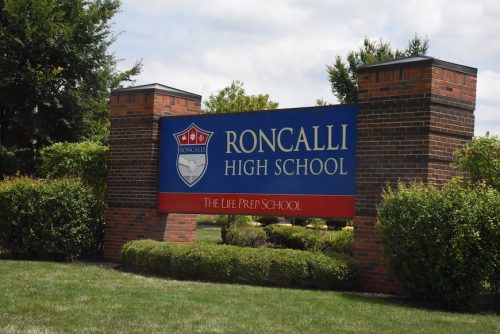By Carol Zimmermann | Catholic News Service
WASHINGTON (CNS) — The U.S. Court of Appeals for the 7th Circuit heard oral arguments May 16 in a case to determine if the government can overturn an Indiana Catholic school’s decision not to renew the contract of one of its faculty members.
The case, Starkey v. Roman Catholic Archdiocese of Indianapolis, involves Lynn Starkey, a former guidance counselor at Roncalli High School in Indianapolis, who sued the school and the archdiocese in 2019, after her contract was not renewed due to her same-sex marriage. School officials said her marriage was a violation of her contract and church teaching.
Starkey’s current case is an appeal of last year’s decision by a federal District Court to throw out her lawsuit.
In dismissing the case, the District Court judge said the school employee’s case did not stand up to the principle of ministerial exception that protects a religious school’s hiring and firing practices from government intrusion.
Becket, a religious liberty law firm representing the Indianapolis Archdiocese, has argued that both federal law and the First Amendment protect religious schools’ right to make hiring decisions based on religious doctrine.
“The Supreme Court has long recognized that the Constitution protects the freedom of religious schools to choose their leaders without government interference,” said Luke Goodrich, vice president and senior counsel at Becket in a statement. “If the First Amendment means anything, it means the government can’t punish the Catholic Church for asking Catholic school educators to support Catholic teaching.”

Starkey’s May 16 appeal took place before a three-judge panel. Goodrich told reporters after the hearing that he was optimistic about its outcome and expected the decision would be based on ministerial exception or religious exemption in Title VII of the Civil Rights Act.
He said a ruling siding with the school and the archdiocese would be in line with previous Supreme Court decisions as well as how other federal circuit courts have addressed this issue, whereas a ruling against the archdiocese would open up thousands of religious organizations and schools to lawsuits.
A Becket statement issued prior to the May 16 arguments said Roncalli High School asks its employees to “sign agreements to uphold the Catholic Church’s beliefs in their personal and professional lives.”
It cited previous Supreme Court cases that have set precedent for this case including the 2020 ruling in Our Lady of Guadalupe School v. Morrissey-Berru — which said religious schools had the leeway to dismiss teachers for poor performance because they serve as ministers — and the 2012 decision in the Hosanna-Tabor case, which said ministerial exception frees religious schools from employment discrimination laws.
In its decision to throw out the Indiana school employee’s case last year, Judge Richard Young of the U.S. District Court for the Southern District of Indiana said: “Ministerial exception is not limited to claims of religious discrimination; it bars all claims of discrimination under Title VII, including discrimination on the basis of sexual orientation.”
The judge also said Starkey’s role at the school was not limited to her position as guidance counselor but that she also helped plan school liturgies, delivered the morning prayer on a few occasions and also took part in school discussions about books to enhance faith formation.
In her 2019 lawsuit, Starkey, who had worked at Roncalli for almost 40 years, said the school and the archdiocese discriminated against her because of her sexual orientation and subjected her to a hostile work environment.
Starkey, who married in 2015, was asked at the start of the 2017 school year to sign an employment contract with the ministerial language clause included. In 2019, she was told she would not be offered a new contract.
After the judge’s ruling last year, Starkey’s lawyer told The Indianapolis Star that she was disappointed with the decision and “concerned about its potential impact, not just on Lynn Starkey, but on all educators in religious schools.”
In response to Starkey’s initial lawsuit against the school and the Indianapolis Archdiocese, the archdiocese said in a statement: “As head guidance counselor, Ms. Starkey signed a contract acknowledging her role as a leader and committing to promote Catholic teaching, including the traditional Catholic teaching on marriage.”
It added that she “knowingly violated that contract” and that her disagreement with church teaching on marriage demonstrated she would “not be able to uphold and model it for her students.”
The archdiocese said that many families “have sacrificed so their children can attend schools where they will learn the Catholic faith. They rely on the archdiocese to uphold the fullness of Catholic teaching throughout its schools, and the Constitution fully protects the church’s efforts to do so.”
In a statement about the May 16 hearing, Goodrich echoed this same view about parents choosing Catholic schools for a reason and added that if these schools “can’t ask their teachers and leaders to support Catholic teaching, it undermines the entire mission of the school.”
“We’re glad the District Court recognized this commonsense principle and we expect the 7th Circuit to do the same,” he said.






















